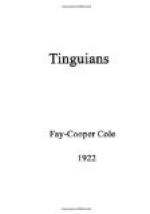Primitive people display more or less timidity in giving their songs for scientific purposes. Such timidity is especially apt to be manifested in their attacks. In the Da-eng, Girls’ Part (Record J), the delayed attack at the beginning of each new verse is very marked. The delay varies considerably from verse to verse, as indicated by the number of beats rest shown at the ends of the lines. Similar pauses are found in the Boys’ Part of the same ceremony (see Record A). These beats rest or pauses are not to be taken as part of the legitimate rhythm, for it is more than likely that if the singers were giving their songs in their regular ceremonial and the performers unconscious of observation, these pauses would not occur.
In transcribing those songs which have several verses on the record, the notation has been so arranged on the page that the measures line up vertically, making comparison easy between corresponding measures of the different verses.
To indicate peculiar qualities, special signs are used in connection with the regular musical symbols. The table which follows shows these signs and also lists the qualities for which they stand. Some of these qualities could have been represented by regular musical symbols, but it was thought best to use the special signs to make them stand out more prominently. The qualities thus indicated as well as those which are represented by the regular musical notation will be found listed and defined after the tabulation of qualities.
Words of the Da-Eng
Part I. Sung in line. [250]
Ma-li-dom ag-dag-da-gi yo-ma-yom
Yom-ma-yom ta yom-ma-yom ag-dag-da-gi
yo-ma-yom.
Ma-la-nas ag-dag-da-gi na-sa-nas
Ma-sa-nas ta ma-sa-nas ag-dag-da-gi
na-sa-nas.
Si On-na-i in-no-bi-yan ki-not-ko-tan
Na-to-tan
Na-to-tan ta na-to-tan ki-not
ko-tan na-to-tan.
Kol-kol-dong si gi-nol-bat nga ag-moli-moli-yat
Mo-li-yat ta mo-li-yat ag-mo-li
mo-li-yat.
Ka-lan-tag kal-la-yan-nen ag-ka-idig-na-yan
dig-na-yan ta dig-na-yan ag-ka-i
dig-na-yan.
A-na-on si Tak-la-yan na-is-ti-lo
ai bolo
Bin-no-lo ta bin-no-lo na-is-ti-lo
ai bo-lo.
Sok-bot ni ka-bin-bin-an adi ma-sil-si-li-ban
si-li-ban ta si-li-ban adi
ma-sil-si-liban
Ba-gai-ba-yem dem-ma-ngen si-nol-bo-dan
ni kolat.
ki-no-lat ta ki-no-lat ai
ag-ki-no ki-no-lat.
Sabak ni am-mo-ga-wen mimog-go-mog
di-kai-wen
di-kai-wen ta ki-kai wen mimog-go-mog
di-kai-wen.
Sabak ni an-na-a-wen mi-ka-li-ya
li-ya-wen.
Li-ya-wen ta li-ya-wen ai
ag-li-ya li-ya-wen
Part II. Sung in line.




